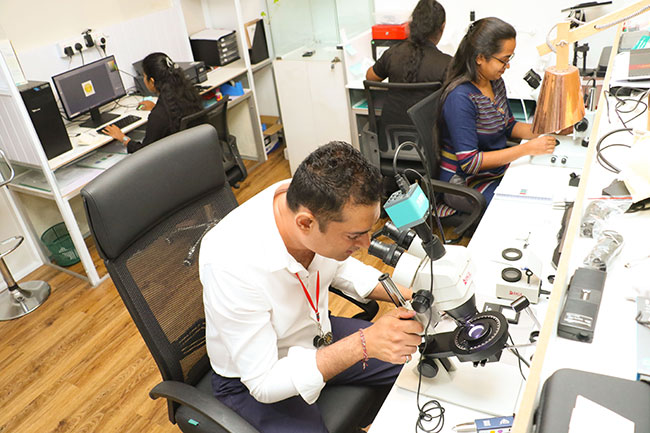Business
DFCC Online Banking enables effortless statutory payments to government departments

DFCC Bank, a pioneer in digital enablement and digital banking innovation, has launched a new service through DFCC Online Banking that enables customers to effortlessly make statutory payments to various public institutions around the clock. This eliminates the need for in-person payments, queues, and long wait times. The bank is offering this service in collaboration with the Lanka Pay Online Payments Platform (LPOPP) and the government’s GOV PAY online payments platform, both powered by LankaPay.
Commenting on the partnership, Aasiri Iddamalgoda – Senior Vice President/Head of Retail Banking and SME at DFCC Bank said, “We are driven by a passion and a commitment to consistently improve customer experiences and deliver simplicity, ease, and convenience through digital enablement. This new initiative aligns with this objective, providing an innovative solution that simplifies your financial life regarding statutory payments. This new feature is also the government’s willingness to collaborate with others to create new ways to transact and manage your financial obligations whilst saving time and enhancing convenience. With 24/7 accessibility from anywhere, you no longer must endure any hassle to make government payments!”
Accordingly, customers can now use DFCC Online Banking to make payments to 13 separate government departments. But our commitment continues beyond there. DFCC Bank is also working with LPOPP to add more government departments in the future, seamlessly, as, and when new billers are integrated onto GOV PAY. This service builds on DFCC Bank’s existing online banking facilities for statutory payments including to the Inland Revenue Department, Sri Lanka Customs and EPF.
Experience futuristic banking convenience today – log in to DFCC Bank’s online banking platform and take advantage of this newly launched functionality to make seamless payments to statutory bodies and government departments. For more information, visit https://www.dfcc.lk/payments-to-government-institutions-via-online-banking/ or contact DFCC Bank’s dedicated customer support 24/7 on 011 2 350 000.
DFCC Bank is a full-service commercial bank with a rich history of 68 years and offers a diverse range of commercial and development banking services. As part of its Sustainability Strategy 2020-2030, the Bank aims to become a leading institution contributing to greater resilience by creating resilient businesses and supporting green financing and sustainable, socially responsible entrepreneurship. The Bank has received numerous accolades, including being named the ‘Most Trusted Retail Banking Brand’ and the ‘Best Customer Service Banking Brand’ in Sri Lanka in 2021 by Global Brands Magazine UK and ‘Market Leader and Best in Service in Cash Management 2022’ by Euromoney. Additionally, DFCC Bank is ranked among Business Today’s Top 40 Corporates in Sri Lanka, is rated A- (lka) by Fitch Ratings Lanka Limited and is regulated by the Central Bank of Sri Lanka. Attesting to its commitment to sustainability, DFCC Bank is also the first, and presently only, entity in Sri Lanka to have received accreditation from the Green Climate Fund (GCF), granting it access to concessionary funding worth USD 250 million to support climate mitigation and adaptation projects across the Island.
Business
‘With AI around, hardly anyone does any real work,’ says university don

While the corporate world celebrates the merger of efficiency and ecology, a leading academic last week issued a sobering warning: the very technology driving the next “Green Revolution” may leave the human workforce behind.
Speaking at the recently concluded Green Productivity Awards, organised by the Sri Lanka Association for the Advancement of Quality and Productivity (SLAAQP), Professor Hiran Amarasekera of the University of Sri Jayewardenepura characterised Artificial Intelligence (AI) as a “godsend” for environmental sustainability – but one that carries profound social risks.
Professor Amarasekera’s keynote address cut through the celebratory atmosphere, targeting a perceived complacency among top-tier management.
“Managers are already using AI, but many CEOs, directors and managing directors remain sceptical,” he observed. “They think AI will come in another five years. No, it is already here.”
According to the Professor, AI is no longer a futuristic concept but a functional tool currently revolutionising green metrics. He highlighted how the technology is already replacing manual monitoring for energy optimisation, using predictive algorithms to drastically reduce industrial waste, and automating sustainability reporting – turning months of consumption data analysis into a task of mere seconds.
While these advancements provide a massive boost to the “bottom line” and help organisations meet the national Net Zero pledge, Prof. Amarasekera warned of a looming “danger”: the displacement of human workers.
“AI is boosting productivity while cutting back the need for human resources. What will happen to the jobs and the wider society? Not even the USA or other advanced economies have an answer to this,” he noted.
In a moment that elicited both laughter and reflection from the audience, he touched upon the irony of modern higher education: “Students produce their work through AI and we detect plagiarism through AI. So, with AI around, hardly anyone does any real work!”
The technological warning was balanced by the moral urgency of Senior Professor Ajith de Alwis from the University of Moratuwa. Invoking the words of David Attenborough, Prof. de Alwis asked the audience how they would look into the eyes of their grandchildren if they knew of the world’s collapse and did nothing.
The takeaway message of the evening was clear: While AI provides the tools to save the planet, human leadership remains the only force capable of managing the social consequences of that salvation.
Despite the warnings of future challenges, the SLAAQP awards proved that Sri Lankan industries are currently making notable strides. The event recognised 38 organisations – including 28 Gold Award winners – across sectors ranging from plantation, garments and rubber to poultry and textiles.
These winners were evaluated on four critical pillars: Leadership, Environmental Sustainability, Productivity Enhancement and Social Contribution.
By Sanath Nanayakkare
Business
Gemological Report of Ceylon sets new global benchmark for local gemstone certification

Steps into a critical void to earn recognition in international markets
For decades, Sri Lanka has been globally revered as the “Island of Gems,” yet the industry has long grappled with a paradoxical challenge: while the Sri Lankan soil yields the world’s finest stones, the local certification process has often struggled to command the same recognition in international markets.
Stepping into this critical void is the Gemological Report of Ceylon (GRC). Located at No. 97, Galle Road, Colombo 3, this newly launched laboratory is on a mission to redefine the standards of local gem certification, ensuring that the “fatherhood” of Sri Lankan gemstones remains firmly within its home soil.
Founded by Milinda Edirisinghe, a seasoned gemologist with over 20 years of experience in mining, trading, and geological study, GRC is the result of a lifelong observation of the industry’s “trust gap.”
“I saw a critical disparity,” says Edirisinghe, who received specialised training in Thailand, the global hub for gemstone treatments. “Sri Lankan exporters often face unfair skepticism in markets like Thailand, Hong Kong, and the US. International buyers often view local reports with doubt. I launched GRC to provide a local institute that is on par with the highest-caliber laboratories in the world.”
He made these comments while speaking to media at the new laboratory.
According to him, in its first month of operation, GRC has already seen a surge in demand, processing 30 to 40 stones daily – a success driven largely by its word-of-mouth reputation.

Milinda Edirisinghe performs a sensory inspection of a gemstone using a loupe to assess its initial characteristics
“The lab’s rapid growth is built on a foundation of total transparency. Unlike traditional setups, GRC employs a rigorous triple-blind screening process: three independent gemologists evaluate each specimen – from Sapphires, Ruby and Emeralds to semi-precious stones, polycrystals, rare meteorites, and even organic materials like natural Pearls, and rare coral species etc., used in high-end jewelry. By evaluating the stones without consulting one another, the three gemologists’ independent findings are then synthesised into a final, authoritative and error-free assessment,” he explained.
“As gemstone treatments become increasingly sophisticated – ranging from Beryllium diffusion to evolving heat and irradiation treatments – the need for advanced technology is paramount. GRC’s facility is equipped to identify the full spectrum of enhancements, ensuring the end consumer knows the exact “human intervention” history of their asset,” he further said.
However, Edirisinghe maintains that technology is a tool, not a replacement. When asked if AI could eventually handle the certification job alone, he noted:
“AI already assists our workflow to an extent, but a human gemologist remains an indispensable part of the process. Just as a surgeon uses advanced technology to enhance precision, they must still be present to execute the nuances of a complex operation. AI cannot truly ‘see,’ touch, or feel the soul of a stone.”
He further added, “AI can support our findings, but it cannot replace the gemologist’s ‘eye-view’ and the tactile senses that go a long way in issuing an accurate certification.”
Furthermore, GRC leverages an international expert network. “If we encounter a complex inclusion, we utilize virtual screen-sharing with leading labs in Thailand for real-time peer review,” Edirisinghe explains. “Our conclusions are science-based facts, not just opinions.”
Beyond technical excellence, GRC serves a vital economic purpose. Historically, local dealers spent thousands of dollars obtaining international certificates. GRC offers these world-class reports at a fraction of the cost, with detailed certificates starting from LKR 15,000 for full reports, a medium report at LKR 6,000, “memo cards” at LKR 1,500, and verbal opinions for LKR 500.
“By providing a credible, globally-recognised home-based laboratory, we are stemming the outflow of foreign currency to international labs,” said Edirisinghe.
With plans to participate in upcoming exhibitions in Dubai, Hong Kong, and the USA, GRC is positioning itself as a global contender. As the industry shifts toward “knowledgeable customers” who view jewellery as a liquid asset, GRC stands ready to provide the clarity and integrity the Sri Lankan gem industry deserves.
“If Sri Lanka produces the best stones in the world, it is only right that we also provide the world-class expertise to certify them. Our mission is to ensure that the ‘fatherhood’ of these precious stones remains in Sri Lanka, backed by a certificate that is respected from the USA to the European Union,” Edirisinghe said in conclusion.
By Sanath Nanayakkare
Business
Ministry of Brands to launch Sri Lanka’s first off-price retail destination

Sri Lanka’s retail landscape will reach a major milestone with the launch of Ministry of Brands (MOB), the country’s first off-price retailer. The flagship store is set to open on 16 February 2026, introducing Sri Lankan consumers to authentic global luxury and premium brands at discounts of up to 90% off original retail prices.
Backed by Akbar Brothers, Ministry of Brands brings the globally established off-price model to South Asia for the first time. The concept allows customers to shop for genuine designer and brand-name products at significantly reduced prices while supporting more sustainable retail practices.
The 10,000 sq. ft. flagship store, located at 28/9, Vajira Road, R.A. De Mel Mawatha, Colombo 4, will feature an extensive range across apparel, footwear, handbags, accessories, homeware, and more. Ministry of Brands will carry over 2,000 international and designer brands spanning womenswear, menswear, childrenswear, home, and accessories, including names such as Gucci, Ferragamo, Valentino, Michael Kors, Ralph Lauren, Burberry, Rag & Bone, Lacoste, Puma, UGG, HOKA, Brooks, Air Jordan, and many more.
Off-price retail is one of the fastest-growing global retail segments, helping fashion houses responsibly manage excess inventory. With the UN Environment Programme estimating 92 million tonnes of textile waste generated annually, sustainable retail models such as off-price are increasingly important.
“Sri Lanka manufactures for many of the world’s leading designer labels, yet these products have often remained out of reach for local consumers,” said Director of Ministry of Brands, Aamir Akbarally. “Through off-price retail, we are proud to make genuine designer brands more accessible to our fellow Sri Lankans, offering premium fashion at affordable prices while delivering a world-class shopping experience built on Akbar Brothers’ longstanding values of integrity, quality, and trust.”
Ministry of Brands Director, Ramzey Hammoud added: “With decades of experience in off-price retail, we see this as an exciting new growth chapter for Sri Lanka’s retail landscape. Our goal is simple: to allow customers to shop global designer brands locally at the best prices, while rediscovering the thrill of the find through a constantly changing, treasure-hunt shopping experience.”
Following the Colombo flagship launch, Ministry of Brands will open a second location at the One Galle Face Mall, with plans to expand across South Asia and Australia.
-

 Life style2 days ago
Life style2 days agoMarriot new GM Suranga
-

 Midweek Review6 days ago
Midweek Review6 days agoA question of national pride
-

 Features2 days ago
Features2 days agoMonks’ march, in America and Sri Lanka
-

 Business6 days ago
Business6 days agoAutodoc 360 relocates to reinforce commitment to premium auto care
-

 Opinion5 days ago
Opinion5 days agoWill computers ever be intelligent?
-

 Features2 days ago
Features2 days agoThe Rise of Takaichi
-

 Features2 days ago
Features2 days agoWetlands of Sri Lanka:
-

 Business14 hours ago
Business14 hours agoMinistry of Brands to launch Sri Lanka’s first off-price retail destination













